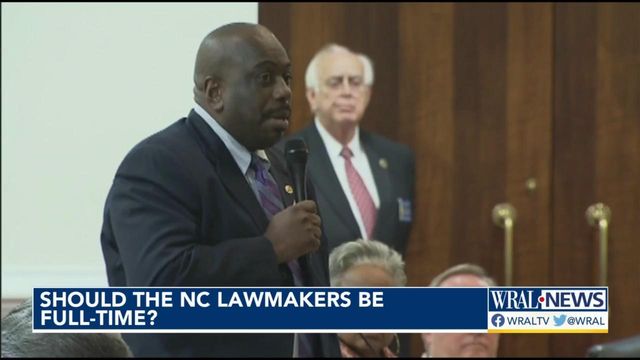Session length pushes out younger, more diverse lawmakers
The legislative session ending Friday lasted fifteen months -- the longest in state history. Some say it's time to start treating it as a full-time job with a commensurate salary, but legislative leaders don't agree.
Posted — UpdatedCharlotte City Councilman Malcolm Graham represented Mecklenburg County as a Democratic state senator for 10 years. He retired in 2016 because he said it had turned into a full-time job with a completely unpredictable schedule.
“I am not independently wealthy. I do not own a business,” Graham told WRAL News Friday. “I was an employee of a private university, and they gave me the luxury of running and serving in public office. But they also wanted me to come to work.”
There’s nothing part-time about being a state senator or being a state House member, he said.
“It’s a full-time job, full-time responsibility, but part-time pay,” Graham said. “That's why you really don't get the young, progressive champions to run and serve in public office. They simply can't afford to do so. So you get retirees, you get people who are independently wealthy or business owners. It limits who serves in public office in the General Assembly.”
Catawba College political science professor Michael Bitzer says the income limitation on representation is a problem.
“That skews, not just the legislature's perspective, but what issues get addressed as well, from a policymaking point of view,” he told WRAL..
Bitzer says higher pay would attract more diverse candidates. Session limits might help, too. A lot of states limit how long sessions can run, including Georgia and South Carolina. That forces lawmakers to prioritize what issues they take up, with the budget at the top of the list.
“Certainly you will see a greater push earlier in the session to get a deal done, to get a compromise so that they can meet that deadline,” he said.
Graham would like to see the legislature become full time, with full-time pay and benefits.
“By practice, that's what we have,” Graham said. “Let's just acknowledge that and fix the system. It should be $90,000 a year for the senators and House members, plus the per diem, and some certainty in terms of when it's going to start and when it's going to stop. And that should not be a political issue.
“Unfortunately, pay in Raleigh, the timeframe when it starts and stops, like everything in Raleigh, is political. And that doesn't do the institution of government any good because it produces bad results,” he added.
House speaker Tim Moore acknowledged this year’s session was too long, and conceded that the growing length of session is making it harder to recruit candidates.
Nonetheless, he said session limits don’t work because other states use special sessions to get around them. And he thinks it’s important to remain a part-time legislature.
“The fact that all of us here either have jobs or careers back home, except for those who are retired, keeps members grounded. It keeps you at home and in touch with the folks that you represent,” Moore said. “I think you can compare that to some full-time legislatures or to Congress, for example, where folks are just so removed from what's going on that things get in a quagmire.”
Moore was quick to shoot down any suggestion of a salary increase, saying it would be “politically unpopular.”
“As long as I'm Speaker, we're not going to give a pay raise,” he said. “Anybody who signs up to do this job for the money is in for a rude awakening, right? I mean, it does cost money for those of us who are here. … It really requires sacrifice.”
• Credits
Copyright 2024 by Capitol Broadcasting Company. All rights reserved. This material may not be published, broadcast, rewritten or redistributed.





